Korea.net has 3,432 Honorary Reporters from 105 countries who share news and stories on Korea in nine languages. They send Korea-related news from their neighborhoods to Korea.net and share articles posted on our site through their social media accounts. The following are last week's ten most-read stories from these reporters.
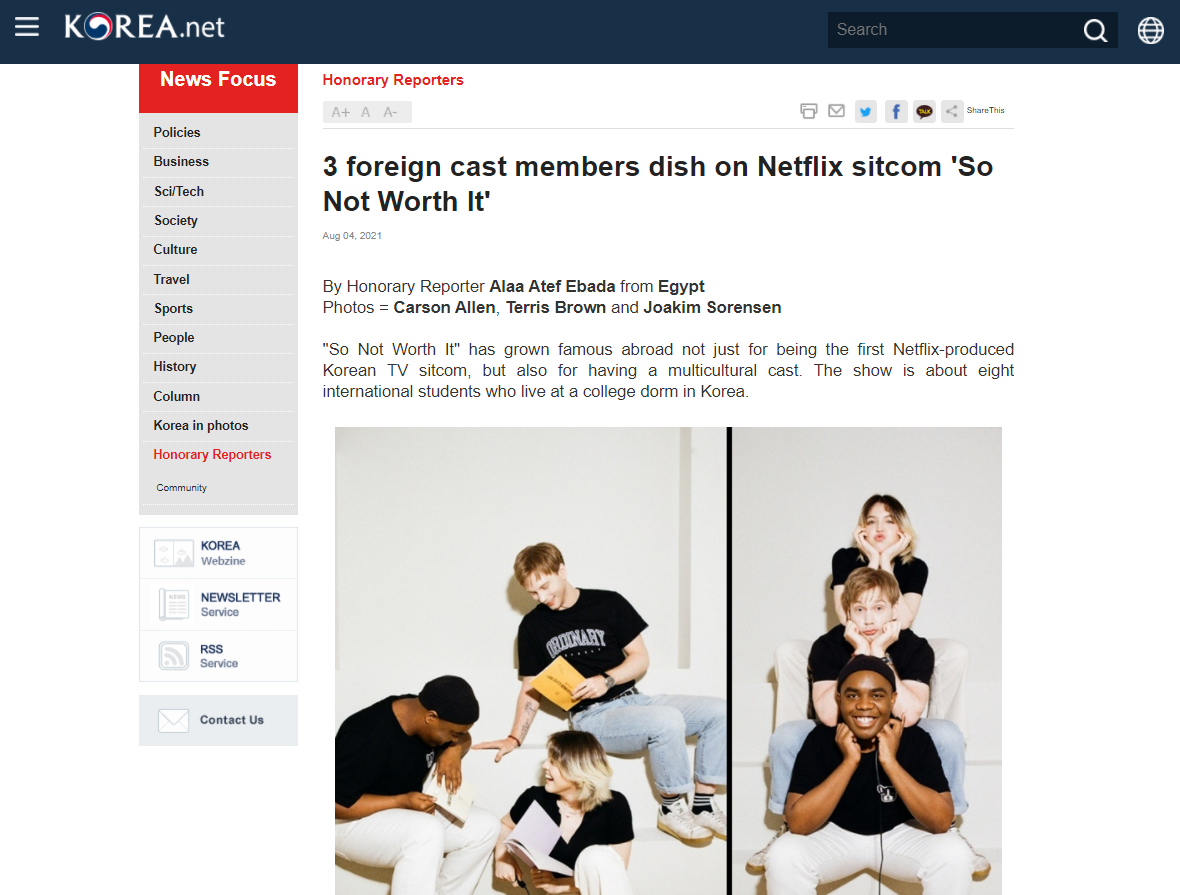
The English-language article "3 foreign cast members dish on Netflix sitcom 'So Not Worth It" by Honorary Reporter Alaa Atef Ebada from Egypt was the most-read story by an Honorary Reporter in the first week of this month. (Screenshot from English-language section of Korea.net)
By Kim Eunhee and Joung Haseung
An interview was the most-read story for the first week of August, with Nos. 3 and 4 also being interviews. The English-language article "3 foreign cast members dish on Netflix sitcom 'So Not Worth It'" by Honorary Reporter Alaa Atef Ebada from Egypt topped the Honorary Reporter chart for the first week of this month.
The other four stories in the top five were in Japanese, Spanish, Russian and Arabic, and rounding out the top 10 were one in Chinese, two in French, one in Arabic and one in Japanese. Articles in all but two (Vietnamese and German) of the nine languages run by Korea.net were evenly ranked in this week's top 10.
■ 3 foreign cast members dish on Netflix sitcom 'So Not Worth It' (Alaa Atef Ebada From Egypt)
This week's top story was an interview with three cast members of the Netflix Korean sitcom "So Not Worth It": Carson Allen and Terris Brown from the U.S. and Joakim Sorensen from Sweden. Honorary Reporter Alaa Atef Ebada conducted a written interview with the trio from July 7-12. The show is about the friendships and love stories of international students at a college dorm in Korea.
The three dished on their hardships while filming the show. Sorensen said, "I initially found my character Hans difficult to play in a language that's not my mother tongue. I put in a lot of effort to make the lines sound as natural and appropriate as possible and got many helpful tips from the director."
All three actors said the show did a good job of reflecting the real life of expats in Korea. To learn more about what it was like to appear on the show with K-pop idol Minnie from the girl group G-idle, read the rest of the interview.
■ Travel through this doll to Gangwon-do Province (Sai Eri from Japan)
Second place went to a Japanese-language article on a unique travel program organized by Koari, an information site about Korea in Japanese. Sponsored by the Korea Tourism Organization and Gangwon-do Province, the event allows those abroad wishing to visit Korea to use a traveling doll to "quench their thirst" for travel in Korea amid the COVID-19 pandemic.
The article shows photos of the doll in Gangneung, Pyeongchang-gun County and Wonju in the province on a two-night, three-day itinerary. Honorary Reporter Sai Eri's article captivated readers for showing travel from the unique perspective of her doll Ryan. Why not visit Gangwon-do with Ryan as the tour guide?
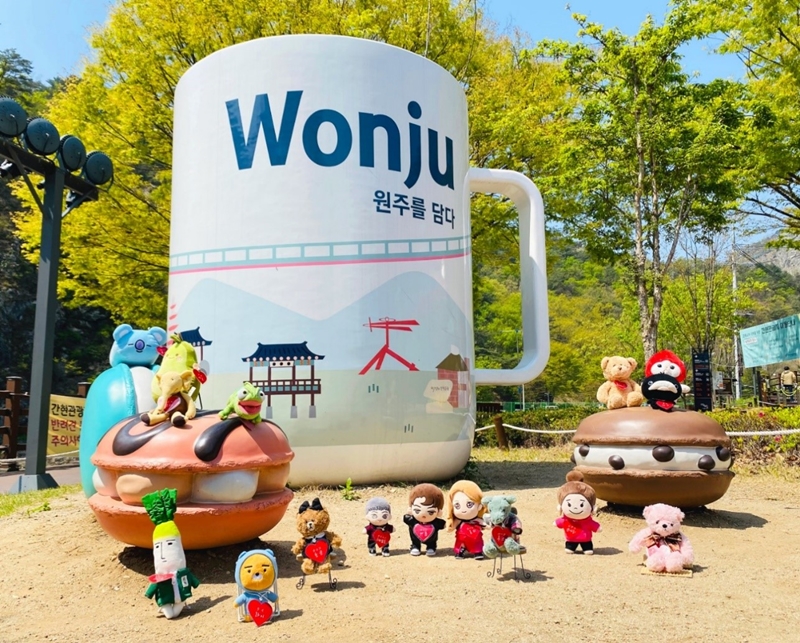
Cute figurines and dolls are displayed around Sogeumsan Mountain in Wonju, Gangwon-do Province. (KOAtabi)
■ Argentina's win-win kimchi initiative 'Kimchuski' (Araceli Gonzales from Argentina)
Third on the list was a Spanish-language interview by Honorary Reporter Araceli Gonzales from Argentina headlined "Argentina's win-win kimchi initiative 'Kimchuski.'" The writer spoke to Korean Argentinian entrepreneur Pio Yoon, founder of the food startup Kimchuski, which produces kimchi in Argentina using authentic Korean methods.
Yoon said he used the name of the spicy condiment for his brand, mentioning the hardships and expectations faced by young entrepreneurs around the world. He added that Kimchuski creates jobs for young people through the processes of producing and selling products such as planting, harvesting, selling and marketing.
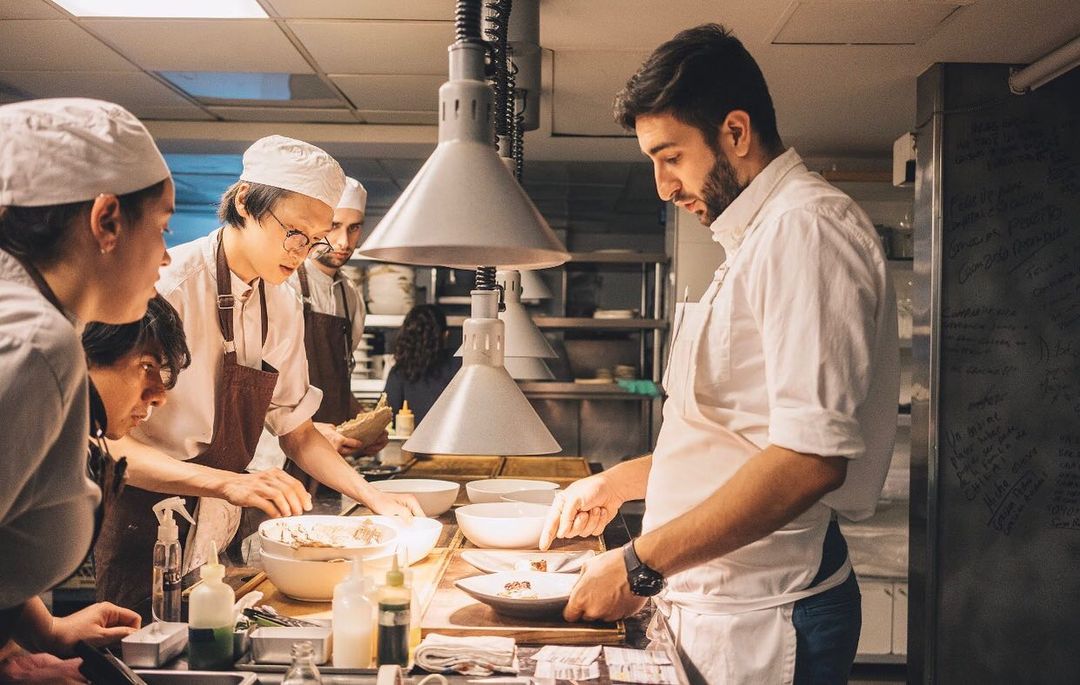
Korean Argentinian food entrepreneur Pio Yoon (third from left) has formed partnerships with restaurants in Argentina. He is shown here cooking at a restaurant. (Pio Yoon)
■ My roots and the care I received from Korea (Petro Pak from Ukraine)
Fourth place went to a Russian-language interview with Anastasia Ten, a descendant of Goryeoin (Korean immigrants in Central Asia) who lives in Ukraine. Born and raised in a Ukrainian farm, she is the descendant of Korean immigrants exiled in 1937 from the Soviet Union. She grew interested in the Korean language and culture and eventually became a Korean-language teacher. Ten has also worked as a translator after joining an education program in Korea run by a foundation of ethnic Koreans abroad.
The article covers why she became an interpreter for a Korean company based in Ukraine, her role there and her plans. Ten helps with communication between officials from both countries at Korean-Ukrainian events and meetings. She said she feels pride in helping to develop relations between Ukraine and her motherland Korea.
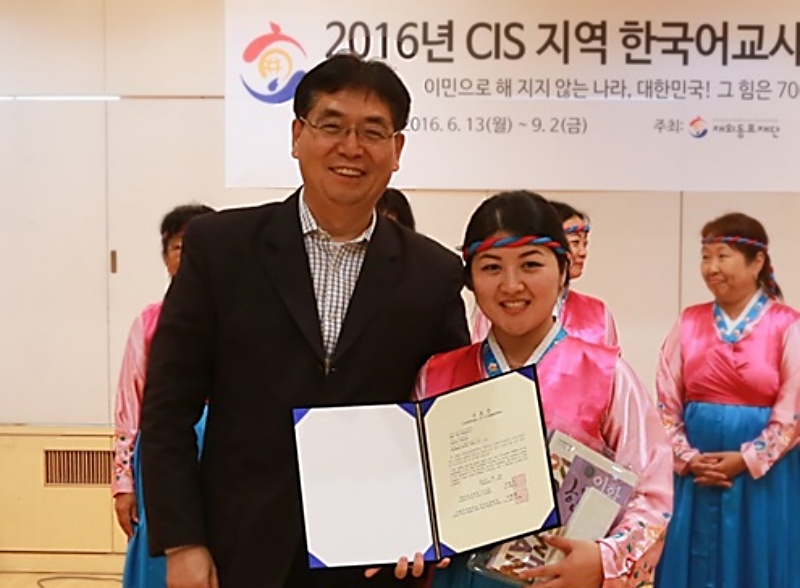
Korean Ukrainian Anastasia Ten takes part in a course for Korean-language teachers in Korea sponsored by a foundation for ethnic Koreans abroad. (Anastasia Ten)
■ Korea's dog days of summer... let's learn about Sambok! (Nour Gamal from Egypt)
Fifth place went to an Arabic-language article on the origin and meaning of Sambok and how Koreans fight the summer heat by eating healthy foods on Boknal, the hottest days of the season. Sambok refers to three of the hottest days between June and July under the lunar calendar. Chobok is the first day of the three and signals the first day of the summer heat. The second day, Jungbok, refers to an even hotter summer day. The final day, Malbok, means the end of the heat wave.
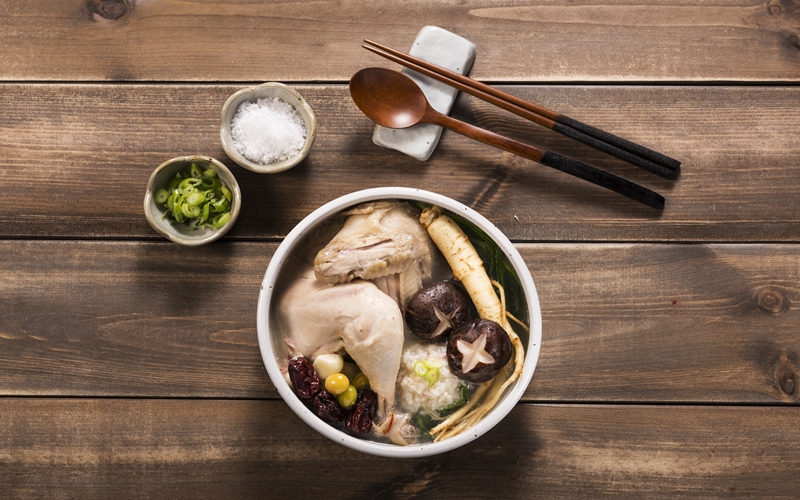
Honorary Reporter Nour Gamal from Egypt said Koreans eat samgyetang (ginseng chicken soup) to beat the summer heat. (iclickart)
*[Unauthorized reproduction and redistribution of the above photo is strictly prohibited under copyright laws and regulations.]
Six to 10 on the list are as follows:
6th: Touring the city of Gunsan (Lv Yizhen from Taiwan / Chinese)
7th: Korean archery reconfirms top spot at Tokyo Olympics (Danielle Tartaruga from France / French)
8th: After the COVID-19 pandemic, I want to visit the Seodaemun Museum of Natural History (Marina George from Egypt / Arabic)
9th: Why I fell in love with Jeju Island (Marion Lavanture from France / French)
10th: The next Korean items to trend in Japan? Garlic bread and mint chocolate (Ohno Ruka from Japan / Japanese)
enny0611@korea.kr